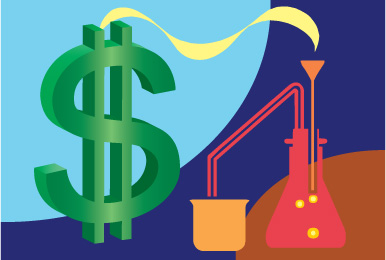Biotech Firms Vie for Federal Funds
New federal biotech grants and tax credits will create winners - and losers.
September 2010

Unsurprisingly, the response to the government's Qualifying Therapeutic Discovery Project tax credit program - which allows companies with 250 or fewer employees to collect up to $5 million - has been largely positive. "This program brings a much-needed shot in the arm to small life science companies for whom the capital markets have been frozen," wrote Jim Greenwood, president and CEO of the Biotechnology Industry Organization, in a statement. "It allows research-intensive small businesses to continue cutting-edge projects to develop advanced medicines and, ultimately, cures to help patients suffering from the world's most debilitating diseases."
It is hard to argue with this logic. But while it makes sense to note the program's potential to turn a few fledgling firms into big winners, a corollary must be included: The federal government cannot pick winners without also creating some losers.
Competitive Advantages
So enticing were these incentives that some expected hundreds, if not thousands, of small- to mid-sized biotech firms to apply for them. Some firms likely submitted multiple applications for promising devices and therapies. With total tax credits and grants capped at $1 billion, significant oversubscription to the program has always been a foregone conclusion. Given the long odds, the program began to resemble a lottery instead of a panacea for emerging biotech companies. It would be downright illogical not to apply for these incentives. But when the government picks the winners, the effect on the marketplace will be noticeable. Suppose five biotech startups, all of which focused on novel cancer therapies, applied for the grants. If the firm that specialized in a chemotherapy cocktail for a certain cancer won a $500,000 grant, its competitors would find themselves at a competitive disadvantage, with relatively less money to spend on marketing or R&D.
Over the long run, what might prove more valuable to that company is the legitimizing effect the federal government lends when it assists one device or treatment over another. Let's say the firm was a pre-revenue company. The $500,000 grant would mean less pressure to raise capital. And the government's stamp of approval could improve the startup's chance of receiving follow-on funding from private-sector sources. The government would have given its support to this cancer treatment.
At some point, all new therapies or devices must cross the crucial hurdle of securing reimbursement status from Medicare, Medicaid, and private insurance providers. Regardless of whether the government intended such a broad interpretation of its actions, observers might see the grant award as evidence that the aforementioned biotech firm had developed promising, cost-effective, and reimbursement-worthy technology. If three of that company's four direct competitors failed to win $500,000 grants of their own, they would find themselves at the back of the pack. One could hardly blame them for being displeased.
This otherwise helpful incentives program actually puts pressure on eligible firms to play the game and submit their applications. Not only do companies want to gain a competitive edge from winning these incentives, they also wanted to avoid competing with other companies that have benefited from a lucrative tax credit or grant. The savviest firms took this program seriously. Over the past few months, companies have been advised to put their best and brightest on the application process, and to think strategically about boosting their odds of being one of the fortunate few to secure these federal handouts.
Project Announcements
BioStem Technologies Plans Boca Raton, Florida, Headquarters Operations
12/06/2025
AstraZeneca Expands Frederick-Gaithersburg Maryland, Manufacturing Operations
11/29/2025
South Korean-Based Nature Cell Plans Baltimore City, Maryland, Production Operations
11/19/2025
Regeneron Pharmaceuticals Plans Saratoga Springs, New York, Manufacturing Operations
11/17/2025
AndHealth Expands Columbus, Ohio, Headqurters Operations
11/14/2025
Taiwan-Based Bora Pharmaceuticals Expands Baltimore, Maryland Operations
11/13/2025
Most Read
-
The Workforce Bottleneck in America’s Manufacturing Revival
Q4 2025
-
Rethinking Local Governments Through Consolidation and Choice
Q3 2025
-
First Person: Filter King’s Expansion Playbook
Q3 2025
-
Lead with Facts, Land the Deal
Q3 2025
-
How Canada Stays Competitive
Q3 2025
-
Investors Seek Shelter in Food-Focused Real Estate
Q3 2025
-
America’s Aerospace Reboot
Q3 2025